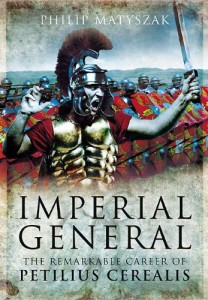Phillip Matyszak
Imperial General: The Remarkable Career of Petellius Cerialis
(Pen and Sword Military, 2011) 188pp. $39.95
If one were to create a list of the most researched periods in Roman history, the Year of the Four Emperors would receive hardly a shrug, even if recognized at all. In Imperial General The Remarkable Career of Petellius Cerialis Phillip Matyszak has written a very readable and accessible work on this most ignored period of Roman Imperial history. His three goals for the work are firstly to describe the background for the institution of a Roman imperial general, next to set out the events and characters important for the year of the four emperors, and finally to interweave a biography of Petellius Cerialis and he achieves them admirably.
Chapters One and Two are essentially a brief history of Roman generalship through the 60’s CE. The section on Republican generals includes a brief but well organized list of generals both mythical and historical. The intent was to set the stage for the conflicts of the first century CE but this section, especially the early republican period, could have been expanded.
Where Mr. Matyszak has gone into detail is the Julio-Claudian period. The discussion of the campaigns and relative merits of the early imperial generals are very useful, especially the discussions of the careers of Germanicus and Corbulo. The one missing general in this period oddly, is Tiberius.
Chapter Three details the revolt of the British tribes against a harsh Roman imperial system, especially that of Boudicca and the Iceni. The author also goes into welcome detail on the initial invasion of Britain and the first resistance to Roman rule. He covers both the political and military situations well, including the change in imperial policy towards the British tribes and the mistakes which caused the revolt of the Iceni.
Here we are also finally introduced to the Petellius Cerialis, the subject of the book and the hero of the continuing narrative. Using the scant extant sources, mostly Tacitus’ Histories, and in some cases “reading between the lines”, we see Cerialis as a legionary commander of the IX Legion in Britain, both headstrong and prone to rash decisions. Matyszak points out that those decisions could have been disastrous for the Roman occupation of the island. Matyszak finishes the chapter with a well written account of the conflict between Paulinus and Boudicca.
Where the book does shine is Matyszak’s discussion of the year of the four emperors (68-9 CE). Chapters IV and V deal with the fluid political situation after the death of Nero between legionary commanders from all over the empire. Cerialis reappears in the narrative in 69 CE with the final conflict between his uncle, Vespasian and the forces of Vitellius. As a member of Vespasian’s family he escapes from Rome with his life, unlike Vespasian’s brother Sabinus, and returns leading the Emperor’s cavalry.
Chapter VI is the most interesting of the book. It describes the revolt of the Batavians and Civilis against the newly installed Emperor Vespasian and Cerialis’ efforts to limit the military and political damage that revolt posed to the new Roman administration on the Rhine. It also does a good job of finally outlining the military and political abilities of Cerialis some 130 pages into the book.
Finally, Chapter VII relates Cerialis’ later career as the governor of Britain, dealing with the revolt of the Brigante and the very politically able Cartimandua, Queen of the Brigante. This phase of Cerialis’ career is notable and fairly well documented, owing to the fact that he was associated with both two competent generals, Agricola, Tacitus’ son-in-law, and military author Julius Frontinus.
As is the case with all Roman military history, the paucity of reliable sources is always frustrating. We know enough about a few important careers or campaigns, but the holes in the narrative are equally vexing. Phillip Matyszak has done a very good job of filling in the gaps in the career of Petellius Cerialis and the action surrounding the crisis of the Year of the Four Emperors.
Jay Roberts
[email protected]

